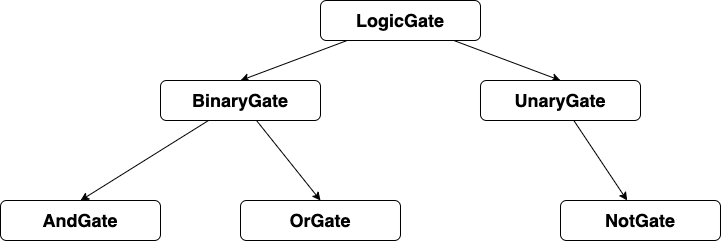class LogicGate:
def __init__(self,n: str) -> None:
self.label = n
self.output = None
def getLabel(self) -> str:
return self.label
def getOutput(self):
self.output = self.performGateLogic() # not implement yet
return self.output
class BinaryGate(LogicGate):
def __init__(self,n: str) -> None:
LogicGate.__init__(self,n)
self.pinA = None
self.pinB = None
def getPinA(self) -> int:
return int(input("Enter Pin A input for gate "+ self.getLabel()+"-->"))
def getPinB(self) -> int:
return int(input("Enter Pin B input for gate "+ self.getLabel()+"-->"))
class UnaryGate(LogicGate):
def __init__(self,n: str) -> None:
LogicGate.__init__(self,n)
self.pin = None
def getPin(self) -> int:
return int(input("Enter Pin input for gate "+ self.getLabel()+"-->"))
class AndGate(BinaryGate):
def __init__(self,n: str) -> None:
super(AndGate,self).__init__(n)
def performGateLogic(self) -> int:
a = self.getPinA()
b = self.getPinB()
if a==1 and b==1:
return 1
else:
return 0
class OrGate(BinaryGate):
def __init__(self,n: str) -> None:
super(OrGate,self).__init__(n)
def performGateLogic(self) -> int:
a = self.getPinA()
b = self.getPinB()
if a==1 or b==1:
return 1
else:
return 0
class NotGate(UnaryGate):
def __init__(self,n: str) -> None:
super(NotGate,self).__init__(n)
def performGateLogic(self) -> int:
a = self.getPin()
if a==1:
return 0
else:
return 1

